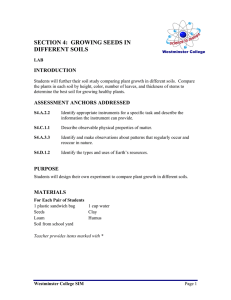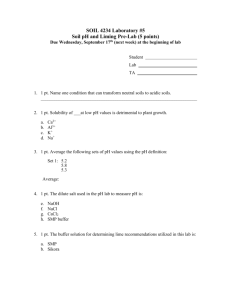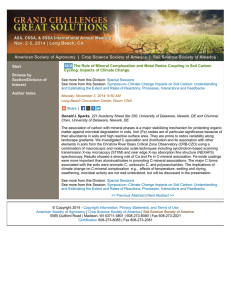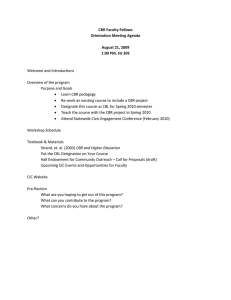IRJET- Improvement in CBR Value of Soil by Adding Lime and Fly Ash
advertisement
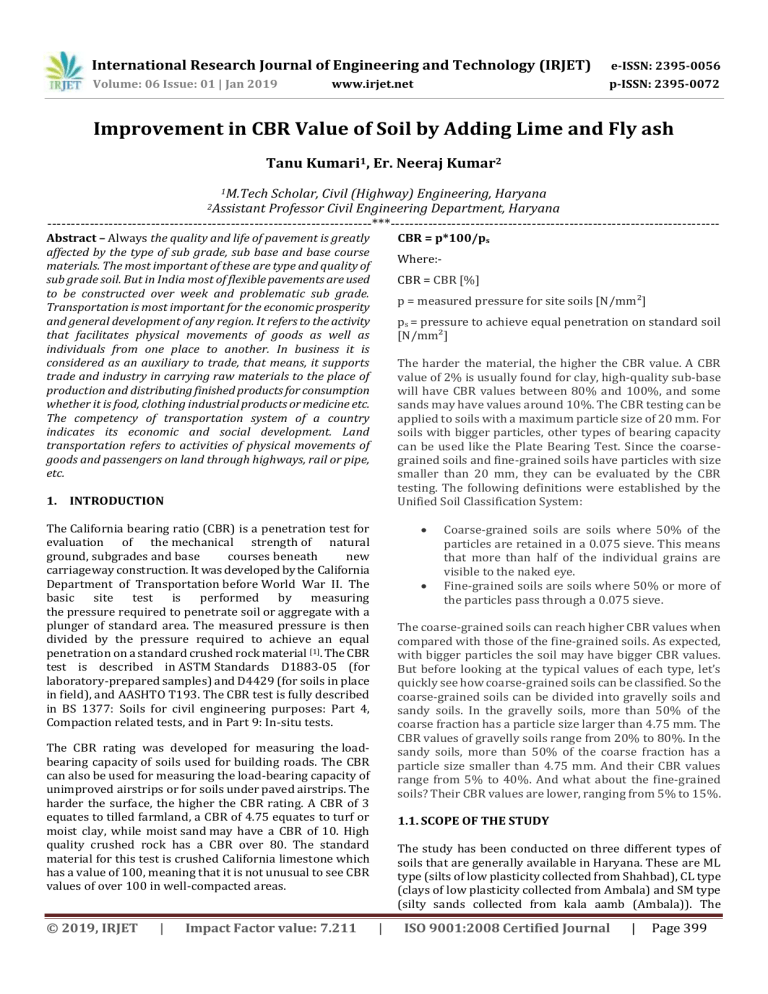
International Research Journal of Engineering and Technology (IRJET) e-ISSN: 2395-0056 Volume: 06 Issue: 01 | Jan 2019 p-ISSN: 2395-0072 www.irjet.net Improvement in CBR Value of Soil by Adding Lime and Fly ash Tanu Kumari1, Er. Neeraj Kumar2 1M.Tech Scholar, Civil (Highway) Engineering, Haryana Professor Civil Engineering Department, Haryana ---------------------------------------------------------------------***---------------------------------------------------------------------2Assistant Abstract – Always the quality and life of pavement is greatly affected by the type of sub grade, sub base and base course materials. The most important of these are type and quality of sub grade soil. But in India most of flexible pavements are used to be constructed over week and problematic sub grade. Transportation is most important for the economic prosperity and general development of any region. It refers to the activity that facilitates physical movements of goods as well as individuals from one place to another. In business it is considered as an auxiliary to trade, that means, it supports trade and industry in carrying raw materials to the place of production and distributing finished products for consumption whether it is food, clothing industrial products or medicine etc. The competency of transportation system of a country indicates its economic and social development. Land transportation refers to activities of physical movements of goods and passengers on land through highways, rail or pipe, etc. CBR = p*100/ps Where:CBR = CBR [%] p = measured pressure for site soils [N/mm²] ps = pressure to achieve equal penetration on standard soil [N/mm²] The harder the material, the higher the CBR value. A CBR value of 2% is usually found for clay, high-quality sub-base will have CBR values between 80% and 100%, and some sands may have values around 10%. The CBR testing can be applied to soils with a maximum particle size of 20 mm. For soils with bigger particles, other types of bearing capacity can be used like the Plate Bearing Test. Since the coarsegrained soils and fine-grained soils have particles with size smaller than 20 mm, they can be evaluated by the CBR testing. The following definitions were established by the Unified Soil Classification System: 1. INTRODUCTION The California bearing ratio (CBR) is a penetration test for evaluation of the mechanical strength of natural ground, subgrades and base courses beneath new carriageway construction. It was developed by the California Department of Transportation before World War II. The basic site test is performed by measuring the pressure required to penetrate soil or aggregate with a plunger of standard area. The measured pressure is then divided by the pressure required to achieve an equal penetration on a standard crushed rock material [1]. The CBR test is described in ASTM Standards D1883-05 (for laboratory-prepared samples) and D4429 (for soils in place in field), and AASHTO T193. The CBR test is fully described in BS 1377: Soils for civil engineering purposes: Part 4, Compaction related tests, and in Part 9: In-situ tests. The coarse-grained soils can reach higher CBR values when compared with those of the fine-grained soils. As expected, with bigger particles the soil may have bigger CBR values. But before looking at the typical values of each type, let’s quickly see how coarse-grained soils can be classified. So the coarse-grained soils can be divided into gravelly soils and sandy soils. In the gravelly soils, more than 50% of the coarse fraction has a particle size larger than 4.75 mm. The CBR values of gravelly soils range from 20% to 80%. In the sandy soils, more than 50% of the coarse fraction has a particle size smaller than 4.75 mm. And their CBR values range from 5% to 40%. And what about the fine-grained soils? Their CBR values are lower, ranging from 5% to 15%. The CBR rating was developed for measuring the loadbearing capacity of soils used for building roads. The CBR can also be used for measuring the load-bearing capacity of unimproved airstrips or for soils under paved airstrips. The harder the surface, the higher the CBR rating. A CBR of 3 equates to tilled farmland, a CBR of 4.75 equates to turf or moist clay, while moist sand may have a CBR of 10. High quality crushed rock has a CBR over 80. The standard material for this test is crushed California limestone which has a value of 100, meaning that it is not unusual to see CBR values of over 100 in well-compacted areas. © 2019, IRJET | Impact Factor value: 7.211 Coarse-grained soils are soils where 50% of the particles are retained in a 0.075 sieve. This means that more than half of the individual grains are visible to the naked eye. Fine-grained soils are soils where 50% or more of the particles pass through a 0.075 sieve. 1.1. SCOPE OF THE STUDY The study has been conducted on three different types of soils that are generally available in Haryana. These are ML type (silts of low plasticity collected from Shahbad), CL type (clays of low plasticity collected from Ambala) and SM type (silty sands collected from kala aamb (Ambala)). The | ISO 9001:2008 Certified Journal | Page 399 International Research Journal of Engineering and Technology (IRJET) e-ISSN: 2395-0056 Volume: 06 Issue: 01 | Jan 2019 p-ISSN: 2395-0072 www.irjet.net laboratory investigations are carried out with a view to improve CBR value of the soils. The admixtures used with the soils include slaked lime (available in powder form) and fly-ash (source thermal power plant Jagadhari). The results of the study are applicable for the given types of soils and given admixture as used in study. The methodology and procedure used for conducting the study, however, being general in nature can be applied to any other soil and admixture having similar properties. Investigations include evaluation of properties like specific gravity, gradation, Atterberg’s limits, and wet sieve analysis, maximum dry density (MDD), optimum moisture content (OMC) and California Bearing Ratio (CBR) value of the selected soils. The lime and fly ash are mixed separately with the each of the soils at 4%, 7%, and 10% by the weight of dry soil. M. M. E. Zumrawi (2014) investigated that CBR can't be easily measured in the field, prediction of CBR from other simple tests such as Dynamic Cone Penetro meter (DCP) and soil properties is a valuable alternative. Various soils have been compacted at different initial state conditions (i.e. water content and dry density) then using laboratory and field equipment to enable the measurement of unsoaked CBR and DCP of these soils. 3. REFERENCES 2. LITERATURE REVIEW S. A.Naeini, R. Ziaie_Moayed(2009) studied that in recent years, soil reinforcement is considered of great importance in many different civil projects. One of the most significant applications of soil reinforcement is in road construction. Sub grade soil and its properties are very important in the design of road pavement structure. Its main function is to give adequate support to the pavement from beneath. Therefore, it should have a sufficient load carrying capacity. Pardeep Singh, K.S. Gill (2012) studied that the quality and life of pavement is greatly affected by the type of subgrade, sub base and base course materials. The most important of these are the type and quality of sub-grade soil. But in India most of the flexible pavements are need to be constructed over weak and problematic sub-grade. H.P. Singh (2013) investigated that randomly distributed fiber reinforced soil is among the latest ground improvement techniques in which fiber of desired types and quantity are added in the soil, mixed randomly and laid in position after compaction. Inclusion of randomly distributed fiber makes the soil mass homogeneous and maintains the isotropy in strength. Shabana Salih K et al. (2014) studied that unpaved roads are usually used for low volume traffic and serve as access roads. When unpaved roads are built on soft foundation soils, it leads to large deformations, causing increase in maintenance cost and interruption of traffic service. The use of geo synthetic products as an inclusion in flexible pavements for reinforcement has been proved to be a viable technology through studies conducted over the last three decades Deepak Yadav (2014) suggested that California Bearing Ratio (CBR) is an indicator of sub grade soil strength. The soil classification and compaction parameters are routinely determined for in-situ and borrow soils used in the construction. © 2019, IRJET | Impact Factor value: 7.211 | [1] Amanpret Guliani, Er. Neeraj Kumar, Study of Existing Highway and their Capacty Improvement, International Research Jonal of Engg. Technology (IRJET), e-ISSN-2395-0056 P-ISSN-2395-0072, Volume 5 Issue 11NON 2018. [2] Study on CBR Values of Soil with Crushed Coconut Shells by Shabana Salih K, Anshi C., Sruthi V., Shyamili T.M., Suhaira P.(2014). [3] Clay Soil Stabilization with Lime effect The Value CBR and Swelling by Gati Sri Utami(2014). [4] Prediction of soaked CBR of fine grained soils from classification and compaction parameters by Deepak Yadav, P.K.Jain, Rakesh Kumar (2014). [5] Prediction of In-situ CBR of Subgrade Cohesive Soils from Dynamic Cone Penetrometer and Soil Properties by M.M.E.Zumrawi(2014). [6] Evaluation of Lime Stabilized Fly Ash as A Highway Material by SP Singh, A Pani(2014). [7] Effects of Coir Fiber on CBR value of Itnagar soil by H.P.Singh(2013). [8] Improvement in CBR value of soil Reinforced with Jute Fiber by H.P.Singh, M.Bagra (2013). [9] Improvement in Properties of subgrade soil by using Moorum and RBI 81 by B.M. Patil, K.A. Patil (2013). [10] Effect of wetting-drying cycles on CBR values of silty subgrade soil of Karaj railway by Moayed R.Z., Lahiji B.P., Daghigh Y. (2013). [11] Effect of lime and fly ash on Engineering Properties of Black Cotton soil by Bairwa Ramlakhan, Saxena Anil Kumar, Arora TR (2013). [12] Soil Stabilization Using Lime by Ankit Singh, Mohammed Faizan, Rehanjot Singh (2013). [13] CBR Improvement of clayey soil with Geo-grid Reinforcement by Pardeep Singh, K.S. Gill (2012). ISO 9001:2008 Certified Journal | Page 400 [14] International Research Journal of Engineering and Technology (IRJET) e-ISSN: 2395-0056 Volume: 06 Issue: 01 | Jan 2019 p-ISSN: 2395-0072 www.irjet.net Improvement in CBR of the expansive soil sub grades with a single reinforcement layer by A.K. Choudhary, K.S. Gill, J.N. Jha, S.K. Shukla .(2012). © 2019, IRJET | Impact Factor value: 7.211 | ISO 9001:2008 Certified Journal | Page 401
